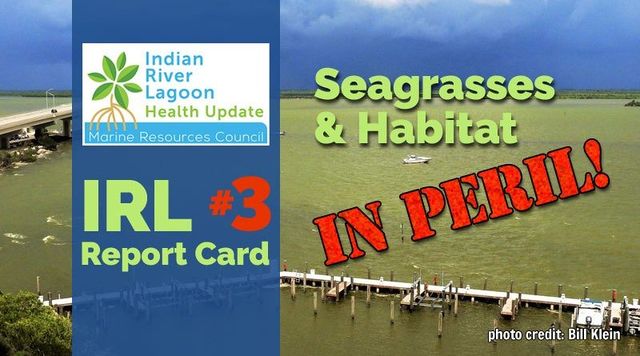IRLNews:2020/12/13/Indian River Lagoon 2020 Health Update: Difference between revisions
mNo edit summary |
mNo edit summary |
||
| (3 intermediate revisions by the same user not shown) | |||
| Line 4: | Line 4: | ||
|Access_Date=2020-12-13 | |Access_Date=2020-12-13 | ||
|Description=The Marine Resources Council studied 25 years of state water quality data collected in 10 Indian River Lagoon regions in order to present their 3rd IRL Health Update Report Card. | |Description=The Marine Resources Council studied 25 years of state water quality data collected in 10 Indian River Lagoon regions in order to present their 3rd IRL Health Update Report Card. | ||
|Image=News indian river lagoon 2020 health update.jpg | |||
|Location=Palm Bay | |Location=Palm Bay | ||
|Region=Florida East Coast | |Region=Florida East Coast | ||
| Line 31: | Line 32: | ||
Many areas of the estuary have scores of >70% and are slowly improving. Unfortunately, an entire lagoon needs improvement with scores of <70%. | Many areas of the estuary have scores of >70% and are slowly improving. Unfortunately, an entire lagoon needs improvement with scores of <70%. | ||
Some North Indian River Lagoon tributaries are scoring 40% with habitat quality falling drastically since the 2016 algae bloom. | Some [https://savetheirl.org/irl-health-update/north-irl/ North Indian River Lagoon tributaries] are scoring 40% with habitat quality falling drastically since the 2016 algae bloom. | ||
< | <div class-"irlcontentmiddle">> | ||
'''North Indian River Lagoon Water Quality Scores''' | |||
[[File:North_Indian_River_Lagoon_Water_Quality_Report_Chart_2020.png|640px|left|thumb|MRC North IRL Water Quality Chart|link=https://i2.wp.com/savetheirl.org/wp-content/uploads/2020-north-irl-and-tributaries-water-and-habitat-quality-scores.png]] | [[File:North_Indian_River_Lagoon_Water_Quality_Report_Chart_2020.png|640px|left|thumb|MRC North IRL Water Quality Chart|link=https://i2.wp.com/savetheirl.org/wp-content/uploads/2020-north-irl-and-tributaries-water-and-habitat-quality-scores.png]] | ||
[[File:North_Indian_River_Lagoon_Water_Quality_Report_Table_2020.png|640px|left|thumb|MRC North IRL Water Quality Table|link=https://i2.wp.com/savetheirl.org/wp-content/uploads/2020-north-irl-and-tributaries-water-and-habitat-quality-scores.png]] | [[File:North_Indian_River_Lagoon_Water_Quality_Report_Table_2020.png|640px|left|thumb|MRC North IRL Water Quality Table|link=https://i2.wp.com/savetheirl.org/wp-content/uploads/2020-north-irl-and-tributaries-water-and-habitat-quality-scores.png]] | ||
</div> | |||
Thanks to the | Thanks to the Marine Resources Council for putting together a water quality report we can all understand. | ||
Link: [https://savetheirl.org/irl-health-update/irl-report-card/ MRC 2020 IRL Health Update Report Card #3] | Link: [https://savetheirl.org/irl-health-update/irl-report-card/ MRC 2020 IRL Health Update Report Card #3] | ||
Latest revision as of 07:01, December 13, 2020
The Indian River Lagoon Health Report Card represents the successful outcome of a public-private partnership between Marine Resources Council and Applied Ecology Inc. The partners have worked since 2015 to create a visual representation of water quality and seagrass data. The report has successfully been used to guide scientific investigation, raise awareness, inspire advocacy, and inform policy-makers.
The report card data were collected by state agency personnel and sent to a certified laboratory for analysis. All data were quality assured before being released to the public, a process that takes 6–12 months.
Six water quality indicators were rated in ten areas of the Banana River, Indian River, and Mosquito lagoons. The water quality indicators include:
- Nitrogen
- Phosphorus
- Chlorophyll-a
- Turbidity
- Water Quality Index
- Habitat Quality Index
The report card's 0-100 rating system is presented using color-coded spreadsheets and charts that are easy to comprehend.
Many areas of the estuary have scores of >70% and are slowly improving. Unfortunately, an entire lagoon needs improvement with scores of <70%.
Some North Indian River Lagoon tributaries are scoring 40% with habitat quality falling drastically since the 2016 algae bloom.
North Indian River Lagoon Water Quality Scores
Thanks to the Marine Resources Council for putting together a water quality report we can all understand.
Link: MRC 2020 IRL Health Update Report Card #3



